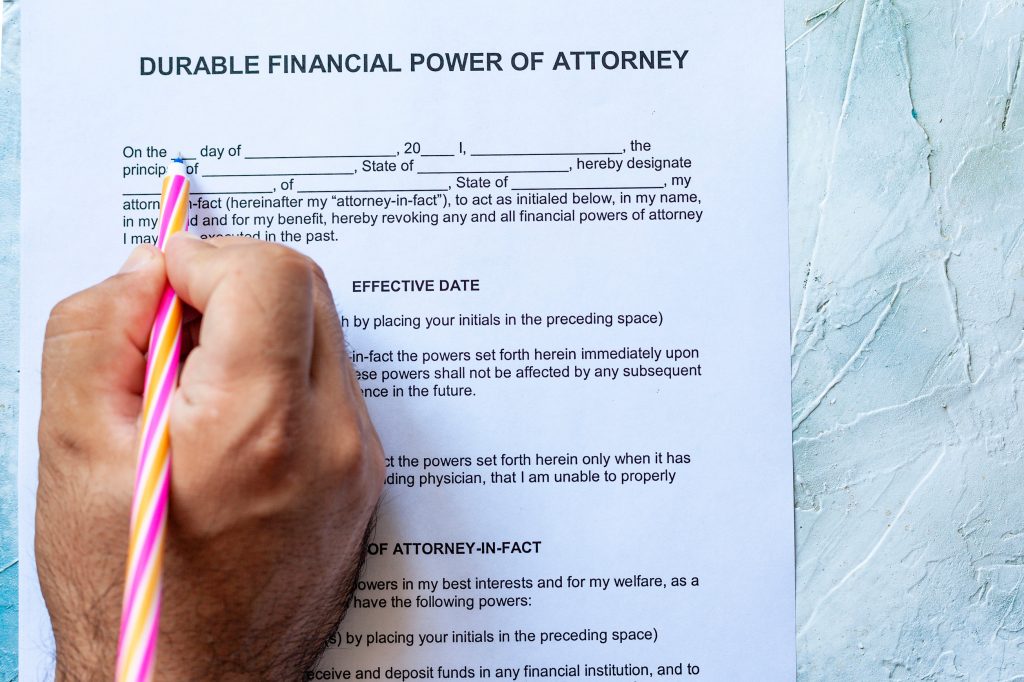
When it comes to finance. Many people try to put safeguards in place to ensure that everything runs smoothly. However, not everyone has a system in place in case they become incapacitated and are unable to manage their financial lives for a period. Luckily, a financial power of attorney can address that issue. If you’re wondering what a financial power of attorney is and whether it’s time to get one. Here’s what you need to know.
What Is a Financial Power of Attorney?
A financial power of attorney is a formal legal document that gives an appointed person – usually referred to as an attorney-in-fact or agent – permission to manage your finances in specific situations. Often, the document allows the person to handle basic tasks. For instance, depositing checks, paying bills, directing insurance benefits, and similar activities. However, you have complete control over the permissions. Thus, allowing you to pick and choose what you want the person to be able to do.
The goal of a financial power of attorney is to ensure that someone can manage your financial life during an unexpected event. It’s designed to provide you with peace of mind. It will also prevent money-related issues that could occur if no one was able to handle the types of tasks outlined above.
Technically, there are two forms of financial powers of attorney. A general financial power of attorney only applies if you are not incapacitated. Usually, it’s meant to reduce the burden of a person who is struggling to manage all of their financial lives but is still technically able to do so.
With a durable financial power of attorney. The person you select as your agent can make decisions if you’re incapacitated. Although their capabilities end if you pass away. This version is more common for end-of-life planning, as well as addressing certain unexpected situations. This includes such as a sudden incapacitating illness. It can also be used during scheduled events, such as during planned surgeries that involve anesthesia, or to address issues relating to mental decline, such as dementia.
How to Tell If It’s Time
Generally speaking, it’s wise to have a financial power of attorney in place as part of your estate planning endeavors. By getting a durable financial power of attorney in place, you’ll have an agent who can act on your behalf should you become incapable of managing your finances.
Since events like accidents, illnesses, strokes, and other potentially incapacitating issues can occur without notice. Being proactive is best. Regardless of your age or family situation. Having a durable financial power of attorney ensures someone can handle critical tasks either until you recover or until your passing. Which can prevent a range of financial issues.
However, if you’re waiting for a triggering event, preparing to undergo surgery could be one. Since going under anesthesia is risky and there may be decisions that need to be made during the procedure, setting up a durable financial power of attorney before the surgery is wise.
Similarly, if you’re diagnosed with a degenerative condition that will impact your mental capabilities, you’ll want one then as well. Setting it up while you’re of clear mind is always best, as it increases the odds that your chosen agent will be respected once your abilities decline.
Even a medical diagnosis for a hard-to-manage condition could indicate it’s time for a financial power of attorney. For example, while cancer may not directly influence your cognitive abilities, the impact of treatment and the stress of battling the condition could make you forgetful. By appointing an agent to assist you during that time, you have someone who can ensure that something important doesn’t fall through the cracks.
Picking an Agent
Whenever you’re setting up a financial power of attorney, you’ll need to select a person to serve as your agent. The decision is ultimately yours. Ideally, you want to choose someone that you trust to act in your best interest who is also capable of handling the assigned responsibilities above all else.
You aren’t limited to specific relationships with the chosen individual, and you aren’t required to favor one option over another. Depending on your situation, you could choose a spouse, family member, or friend. If the decisions relate to a business you run with another person, selecting a business partner may be wise.
In some cases, you may even want several financial powers of attorney. That way, you can divvy up various tasks between individuals that are best suited to those tasks. For example, you could ensure a spouse can handle your personal finances, while a business partner manages company-related matters.
It’s also important to note that you can change your mind and revoke a financial power of attorney. As a result, if your situation changes and you want to ensure someone can no longer act on your behalf. yYu can do so as long as you’re considered mentally sound. Then, you can select a new agent. Thus, allowing you to adjust your choice whenever necessary.
Have you set up a financial power of attorney before? If so, what prompted you to do so? If not, is there a reason you haven’t moved forward? Share your thoughts in the comments below.
Read More:
- Financial Planning Basics: The Financial Pyramid
- Where to Find Free Financial Planning Classes
- Signs That You May Need a Financial Advisor
Tamila McDonald is a U.S. Army veteran with 20 years of service, including five years as a military financial advisor. After retiring from the Army, she spent eight years as an AFCPE-certified personal financial advisor for wounded warriors and their families. Now she writes about personal finance and benefits programs for numerous financial websites.